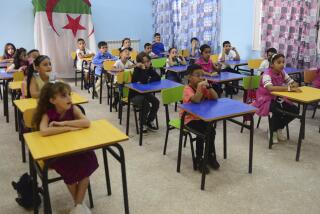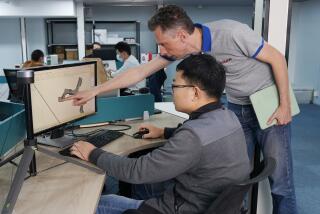Market Scene : Building Boats and Battling Bureaucracy : There is no shortage of business in Algeria, only a regime that keeps the production line moving at a crawl.
- Share via
ORAN, Algeria — There are 746 miles of coastline stretching from the Moroccan border east to Tunisia, and beyond that, the blue Mediterranean. The Algerian shore is speckled with harbors, ports and deep coves rising to meet white beaches.
Nouria Gaouar looks out on the seafront and in her mind’s eye sees it covered with boats--lots of them. Little sails bobbing along the horizon. Speedboats roaring past a line of bluffs. Motor cruisers. Deep-water fishing vessels.
So far, it’s only wishful thinking by an entrepreneur whose 30 employees, working out of a small factory near here, turn out a modest eight pleasure boats a week. Gaouar figures that she could easily up the output to 12 boats a week and that she could probably sell three times that many. There’s already a two-year waiting list to buy her boats.
The problem isn’t the demand, she fumes. It’s a government purchasing bureaucracy that has kept her production line at a crawl.
“We have beautiful sea resorts, ports which are empty. People are coming to see me, begging me to sell them boats, and I do not have the product,” she complained.
“I go to the National Chamber of Commerce, and when I ask them to give me the possibilities to work and to honor the demand for boats, the answer is, ‘Madame, we have other priorities, and you will have to wait. . . .’ You see, in this country, there is no room for an ambitious person.”
In Algeria, where state ownership of business has long been regarded as the best way to protect the country’s socialist ideals, business owners such as Gaouar have traditionally been regarded with suspicion--even distaste.
But four long years on the brink of economic crisis have brought new ideals to Algeria. And out of the government’s efforts to start turning a profit from the country’s burdensome public industries has been born an aggressive new class of private entrepreneurs ready to take advantage of economic reform.
Nowhere have the new fiscal winds been blowing stronger than in the northwest port city of Oran, long the predominant base of Algeria’s struggling private sector.
A city of 700,000 that is the country’s second largest, Oran is not far from Tlemcen, an ancient stop along the old caravan route from Morocco. It has always been a commercial center with a lively merchant population. After Algeria gained independence in 1962 and the French swarmed out of the city--200,000, about 90% of the population, evacuated--Algeria’s first native industrialists moved into Oran.
Today, Oran has the feel of a small-town port community that has burst its borders. Its elite still gather at the hotel coffee shop downtown to chat, but business is increasingly done in the huge new industrial parks that have sprung up in the orchards and farmlands miles from the heart of the city.
The government still dominates Algeria’s heavy industries and the oil production that remains the country’s lifeline. But private entrepreneurs have moved increasingly into such fields as construction, housing materials, textiles and plastics.
According to Chamber of Commerce figures, the private sector now controls 80% of plastics production in Algeria. Private companies are producing about half the nation’s textiles--even though their factories are able to operate only eight hours a day because of raw material shortages while preferred state-owned textile companies run around the clock.
Oran has also become a growing center of political activism for private business leaders impatient at the slow pace of turning Algeria into an open marketplace.
Earlier this year, Oran business owners organized a weeklong factory shutdown to protest delays in implementing reforms that will give them easier access to imported raw materials and commercial credit. Nearly 7,000 companies in western Algeria closed their doors.
The Oran Chamber of Commerce, once shut down and accused of being a front for the CIA, has reopened and, under new reform laws allowing it to hold political meetings, is organizing forums and signing up vocal new members. A major remodeling of the headquarters downtown is nearly complete.
“Our tradition in the west (of Algeria) is to think, to work, to create. It is a part of our nature,” said Oran Chamber President Ahmed Bensaadoun, a leather-and-textile manufacturer who organized the February protest. “It could be the nature of the soil, the climate; the region is full of plains. We do not have a restricted view, as it is when you live in a mountainous area like Algiers.”
But for all the feverish half-starts, business owners complain there has been little real growth in the private sector because reforms have not been fast enough or wide-ranging enough.
Bensaadoun, who owned a single leather shop 10 years ago, now employs nearly 1,100 people. But he complains he can’t get the kind or quantity of imported yarn he needs to keep the mills running. Another businessman, Bachir Benamar, spent $2.5 million to build a new sports-shoe factory but can’t get the equipment he needs to open it.
Boatmaker Gaouar can’t get the resin, fasteners, sails, windshields and motors she needs to keep boats coming off the line, so she has her crew making plastic seats for Oran Airport.
“This year for us is the worst year. I applied for these import licenses more than eight months ago,” she said. “Do you realize what that represents, for a factory to wait eight months? It is hell!”
A fundamental part of the problem has been resistance from old-guard socialists in the ruling National Liberation Front (FLN) to opening the economy to private--and especially foreign--investment.
“The Algerians’ sense of the private sector is that it is exploitative and that it is basically feeding off the people,” said one analyst. “The feeling is that after the revolution in ‘62, we were all the same; (therefore) if (someone) has money, he must have stolen it from us, because we were all in this together.”
When the Oran factory owners organized their protest in February, the government press was scornful, branding them a “cartel of millionaires.”
Before the economic reforms that began in 1988, it was difficult, if not impossible, for a private entrepreneur to get a loan from a bank to start up a business. Loans of more than 3 million dinars ($370,000 at the legal exchange rate; $100,000 at the more widely used black-market rate) had to go through the Ministry of Planning, and in no case could a private entrepreneur borrow more than 30 million dinars.
More troublesome has been access to hard currency to import raw materials. Plummeting oil prices since 1986 have left Algeria with only about $8 billion per year for importing the huge array of food and goods on which the country relies. Only about $1.1 billion of that was allocated to the private sector last year.
In recent years, factory owners have had to apply for import licenses and hard-currency allocations to cumbersome state monopolies that seldom delivered the kind or quantity of goods ordered and that were almost never on time.
Gradually, President Chadli Bendjedid has been maneuvering reform measures through the FLN-run National Assembly. A new commercial banking network is being established, and business owners will soon be able to apply directly to banks for loans. They will be allowed to compete on equal footing for credit with public sector industries that in previous years were automatically granted most of the available credit.
The state purchasing monopolies have been eliminated, allowing business owners to deal directly with suppliers and apply for hard currency through the National Chamber of Commerce.
More importantly, after two years of foot-dragging, the National Assembly attached a significantly liberalized joint venture provision to the law that codified the bulk of the reforms March 26.
“This law is the most revolutionary thing that has hit this country since independence,” said one Western economist studying the reforms. “It’s overthrown 25 years of Soviet centralist Marxism, and it’s moving into a market force-type economy.”
The law eliminates most restrictions that previously limited foreign ownership of companies to 49%--holdovers of decades of fears about foreign interference that followed Algeria’s war for independence from France. It also permits foreign partners to repatriate their profits. Both provisions are expected to encourage foreign investors to plunge into Algeria’s fledgling private sector.
Raising questions over the entire economic reform movement, meanwhile, is last month’s victory by Islamic fundamentalists in municipal and provincial council elections.
The Islamic Salvation Front (FIS) that captured 55% of the councils and which is seeking immediate national elections has declared itself pro-private business. Mohammed’s first wife was a merchant, the movement sometimes points out.
But Western analysts believe the Islamic victory may discourage new foreign investment in Algeria.
“Foreign investments in Algeria would be very difficult to get, even without the FIS,” countered Bensaadoun. “Be objective. Americans will not be ready tomorrow to invest, as we are not materially organized, we do not belong to the list of countries yet in which foreign countries are willing to invest. So there was a possibility at this point of maybe 1% or 2% foreign investment. It is not much. But the benefit for Algeria itself that will come out of this result from a psychological and moral point of view is far more important . . . .Algeria will become a strong nation, and foreign investment will follow.”
More to Read
Sign up for The Wild
We’ll help you find the best places to hike, bike and run, as well as the perfect silent spots for meditation and yoga.
You may occasionally receive promotional content from the Los Angeles Times.






